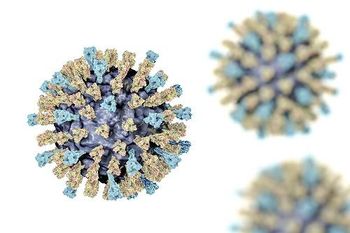
Encouraging Symptomatic Patients to Get Tested for Respiratory Infections
Experts share their approach to encouraging patients with symptoms of respiratory infections to get tested and vaccinated, and how that helps to control the spread of sickness.
Episodes in this series

Tina Tan, MD: Kevin, in the urgent care outpatient setting, how do you convince individuals coming to you to get tested, and then if they haven’t been vaccinated, to get vaccinated against what we can vaccinate and protect them against?
Kevin Michael Reiter, MD, PA: That’s a great question. I don’t think there is a problem convincing people about testing. During various stages of the pandemic, testing was all people wanted. You saw the lines wrapped around the corner and down the block for testing. Once home testing became more available, we do from time to time see folks who say, “I did my home test. I know this is just my annual sinusitis. I need my antibiotics.” If they’ve done a home test and it’s negative, I’m OK with that as long as I educate them that they need to continue to do the home tests. As was mentioned previously, it’s a sequential thing. One home test was negative yesterday, but because it’s an antigen test and we know the sensitivity is not great, and we know it’s based on prevalence and pretest probability, doing repeated tests is important. In those situations, if I’m not really convinced it’s a bacterial infection as they are, I will encourage them to do a better test, to do a molecular test. Patients in general, consumers across the country, are on edge, so we try not to push. If someone doesn’t want to do a particular test and we think it’s appropriate, we can only lead a horse to water, but we can’t make it drink. I think we encourage those folks to do repeated antigen testing.
In terms of vaccinations, I think that’s really important because we’ve seen with the bivalent vaccine the percentage rates are abysmal for folks who have taken the bivalent vaccine, at least in my neck of the woods in patients I’m seeing. I think it’s really important for us. Usually, they come to us with COVID-19, and they say, “Man, I wish I would’ve gotten that vaccine.” Obviously, that’s an opportunity where education may not influence that individual, but it may influence their partner, or it may influence someone else in their home to go out and get vaccinated, which I think is extremely valuable. In terms of flu vaccinations, with the warnings that were given early in the season, I think there’s been a fair number of folks who have heeded the warnings and gotten the flu vaccines.
What I’ve learned in my practice is with the COVID-19 vaccines, patients somewhat learn that getting the vaccine doesn’t mean they’re not going to get the illness. It has taken time, but it’s a dampened down version. That knowledge is something I always preached to my flu vaccine patients, but it really never stuck. It was a really hard lesson. I think now with the COVID-19 vaccine lessons, it’s easier to explain to patients, this isn’t a get-out-of-flu-free card. This means your symptoms will be so mild that hopefully, I’m not going to see you again. If we do, there are options. I think there’s a lot of opportunity for us to discuss vaccinations with family members and then future vaccinations. If that person is in my office and they didn’t get the bivalent, and now they’re infected with COVID-19, they may be more likely 3, 6 months, or 1 year down the line to get the next booster when it becomes available.
Tina Tan, MD: Wendy, what do you do with those parents who don’t want to get their children vaccinated? Because we know that even though it was fantastic that the COVID-19 vaccine was approved for use down to 6 months of age, people are not getting their children vaccinated. That’s a problem because they’re not getting the COVID-19 vaccine, and they’re not getting the flu vaccine. Now you have COVID-19, flu, RSV [respiratory syncytial virus], and other viruses that are circulating so these kids are getting really ill. What has been your experience in trying to get parents to vaccinate their children?
Wendy Wright, DNP, ANP-BC, FNP-BC, FAANP, FAAN, FNAP: Thank you for asking because my entire doctoral work was vaccine hesitancy and vaccine communication. This is truly my baby. First of all, there is information out there now that only 40% of people in the United States have received a flu shot this year, so we still have a lot of work to do. If I’m looking in my refrigerator, I can tell you we still have a lot of vaccines sitting in that refrigerator, and that is really frightening to me. As I tell parents all the time, that vaccine does no good when it sits in my refrigerator. A few things we do know that work; No. 1 is giving a strong recommendation, and that is saying something like; “I’m looking at your child’s vaccine list. I can see that they’re due for flu today. We’ve got it available. Let’s get it on board.” That’s how I speak about vaccines. I don’t say, “How do you feel about that vaccine, Johnny? Do you want to get a shot?” Because we know that gives them an out and most people won’t take it. I also am not afraid to use the mom card. I’ve used it for 25 years, and I play it every single day. “What I’m asking you to do for your child is no different than what I’ve done for my son.” I use that all the time. I also talk about the fact that an ounce of prevention is worth a pound of cure. I’m also not afraid to say every vaccine that we house in this clinic is without preservatives. For some parents, that means a lot to them. I don’t go down that road with them, but I say, “We’ve got it here, let’s get it on board.”
But you’re right, Tina, this is the hardest group to vaccinate. When we talk about children, there are 2 shots I know I’m going to struggle with, HPV [human papillomavirus] and flu, and now COVID-19. Those are the trifecta, basically. I just use that confident language. My practice manager always asks me, “How do you get these people to vaccinate?” Because they’ve seen these other nurse practitioners who didn’t get patients to vaccinate. I think it’s in the presentation. I’m old so I can get away with saying things like, “Listen, it’s really important. This is a bad flu season. Let’s get it on board and hopefully, your child is not going to get this illness or if they do, it’s mild.” But I think you’re right. What we’re doing also is we’ve reset how we’re talking about flu and COVID-19. Now we’re saying these may not protect you from getting it, but they are definitely keeping people out of the hospital and keeping people from dying from them.
Transcript edited for clarity
Newsletter
Stay ahead of emerging infectious disease threats with expert insights and breaking research. Subscribe now to get updates delivered straight to your inbox.






































































































































